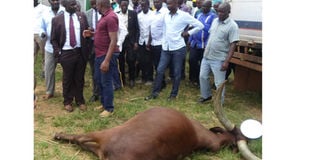Pastoralists cry foul over cattle movement ban

Intercepted. Mr Christopher Kalemba, the Kakuuto County MP in Kyotera (left), talks to the district police commander, Mr Grace Mutono, as they inspect a dead cow which was reportedly smuggled from Tanzania on Sunday. PHOTO BY AMBROSE MUSASIZI
What you need to know:
In 2017, the Ministry of Agriculture declared quarantine and passed tight restrictions in parts of the country where diseases such as foot and mouth, Contagious Bovine Pleuropneumonia and other human diseases like Hemorrhagic fever were spotted.
Kyotera. Pastoralists at Uganda –Tanzania border have faulted government over failure to enforce measures aimed at curbing animal diseases.
Initially, livestock farmers, especially at Mutukula and Bugango border posts in Kyotera and Isingiro districts respectively, were freely crossing on either side in search for water, pasture and cattle markets.
But due to continuous outbreak of animal diseases, government placed many cattle corridor districts under quarantine last year.
“We have been wondering whether it was political rhetoric or government officials meant what they were saying,” Mr Fred Kalangira, a livestock farmer from Kamuli Village Mutukula border, said yesterday.
Mr Amon Kanyomwabazyo, another pastoralist in Lwambajjo Village, Rakai District, said some farmers occasionally cross to Tanzania due to lack of enough pasture and water.
“Some rich cattle dealers continue to bring herds of cattle to Uganda even after government slapped a ban on cross-border cattle movement. Some farmers have also resumed taking their animals to Tanzania because [since they do not see] anyone enforcing the ban,” he said.
Mr Steven Ssebunya, the Kakuuto Sub-county chairperson, said his office has registered numerous complaints from livestock farmers about the porous borders.
“I have been submitting their complaints to concerned authorities, but unfortunately, we have not received any help,” Mr Ssebunya said.
However, Ms Joy Kabatsi, the State minister for Animal Industry, said the ministry has partially lifted the ban after districts near the border were declared disease free.
“Following an outcry from cattle dealers from both countries, we took a decision as ministry to allow cattle from Tanzania to cross into Uganda. But this happens on condition that they [cattle] are checked by veterinary officers and confirm that they are disease free. Of course, those that are smuggled, are impounded on sight as soon as they enter the country,” Ms Kabatsi said.
Mr Ben Nuwamanya, the Kyotera police commander, said they are implementing the ban with the help of the veterinary office because transporters must have certificate of health to certify the condition of the animal.
“Cows from Tanzania are marked with Tanzanian numbers and this helps us easily detect and identify them from all our check points from Mutukula border to Kampala,” Mr Nuwamanya said.
Dr Kimbugwe Kiwanuka, the district veterinary officer, said cows which cross to Uganda are owned by Ugandans who entered Tanzania illegally. “Most farmers are nomadic and Kyotera and Rakai districts usually suffer drought conditions which force them to search for pasture and water in Tanzania,” he said
Dr Kiwanuka said his office is also coordinating with farmers to report any sign of the disease in the area, liaising with technical counterparts in Tanzania and issuing health certificates to ensure that no infected animals enters the country.
“For example, one must have a letter from village chairperson, parish chief, ISO and police to authorise movement of animals,” he said.
Previous effort
In 2017, the Ministry of Agriculture declared quarantine and passed tight restrictions in parts of the country where diseases such as foot and mouth, Contagious Bovine Pleuropneumonia and other human diseases like Hemorrhagic fever were spotted. It was alleged that veterinary officers in Isingiro, Kiruhura, Sembabule, Gomba, Nakaseke, Mubende, Nakasongola, Luweero and Rakai districts connived with business people to transport animals that come from infected areas in Tanzania to abattoirs in Uganda.




